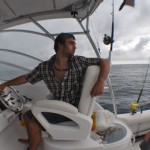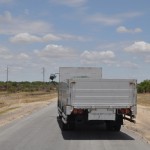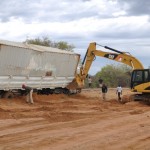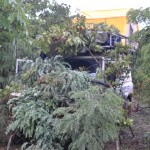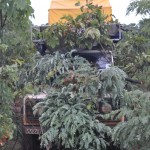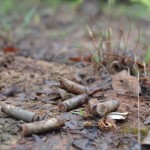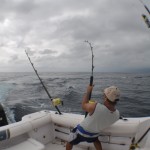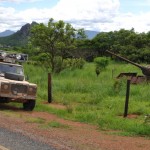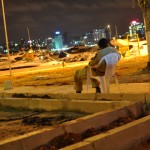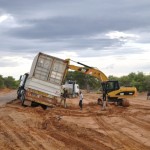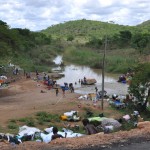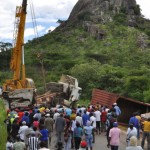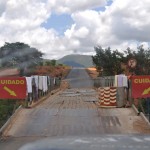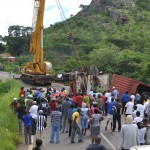Before starting our latest instalment, we should point out that a photo blog was uploaded just but minutes before this one so do have a look if you missed it.
Having left Carl’s brother Christian in Kasane for his flight home, we turned West and headed back into Namibia.
Tearing along the Caprivi strip, leaving Botswana behind, we made good progress towards the Angolan border. Having spent the last week or so in one game park or the other, we were unsurprised to see elephants, buck and giraffe along the roadside as we headed out. Whilst the parks were fantastic, animal spotting can be hard work (especially when it’s unsuccessful), so after a solid week we were somewhat ‘animaled out’ and pleased to be back on the road, the familiar roar of the Landy sending Tom to sleep in no time at all.
However, despite treating wild animals with respect (even more so after hippo had charged us whilst we tested the water depth on a road in Moremi Game Reserve!), we were unprepared for the large grey roadblock we encountered on our second day back in Namibia. As we cautiously approached the elephant herd which was blocking the road, we noticed one large male in particular was unhappy with our presence.
We stopped well clear, allowing the herd to cross ahead of us, so as to prevent alarm. However, the male ‘phant refused to move, stubbornly straddling the centre line. We gave him more time and, conscious that we had timescales to keep (such as returning home before reaching pensionable age) we inched forwards.
Moments later, having never been charged head on by an elephant before, we both marvelled at the immediate acceleration this great beast was able to muster. With Carl throwing the Landy into reverse, we backed off at some speed.
However, our opponent duly sped up again. We had now covered 100 metres or so; the transmission singing with the effort of reaching top speed in reverse. As we were forced to contemplate a James Bond-esque j-turn, the beast slowed. Reduced to a jog (an elephant jogging at you is only slightly less terrifying than an elephant running at you), his point now made, he turned and walked off to stand on the road once more.
We sat. Time passed, another car approached. Having warned them of the crazed juggernaught ahead, they proceeded and we followed slowly and, just before he noticed us again, floored the 300tdi and shot past, to the accompaniment of a cab-shaking trumpet blast from our out-foxed adversary, leaving him vainly jogging in our (quite literal) smoke.
We continued on until just short of the border, as we had been invited to stay with Phillip, a man we had met in Die Hel with the local LR club, at his grinding/crushing plant in northern Namibia.
Not only did Phillip put us up for the night in a caravan each, he supplied us with dinner and set about ensuring that we could relax in comfort before we finally started the last leg of our journey; the journey into West Africa.
Not content with feeding us and putting us up, Phillip also insisted on filling our diesel tanks and jerry cans, saving us a bundle! As we professed our thanks Phillip brushed his generosity aside, noting that “You guys need these sorts of surprises on a trip like yours”. And so continues the Africa-wide story of generosity continues.
The Angolan border confirmed that we were back into ‘real’ Africa. The beguiling blend of camouflage, agents, changer moneys, hangers-on and chaos fills ones senses and the stream of paperwork, questions and office-to-office walks begins again. Mix that in with an inevitable sense of nervousness with the progress of our trip relying on each border crossing and you have yourself a lot to think about on border crossing mornings.
After a slight hitch with the Angolan visa, paperwork was sorted, we were into Angola and pressing north along shoddy tarmac, shared with the customary ‘crabbing’ trucks, courtesy of the front and rear axles being out of alignment, resulting in the appearance the truck is going sideways when in fact it is actually going dead straight. The tar was shoddy, but passable. Not for long.
After a couple of hours drive, the tarmac stopped. In its place was what our Africa maps describe as ‘badly potholed’. We assume the word ‘badly’ is used here in the same way that reportage of the Attack of the Light Brigade was described as having ‘gone badly’.
The next few days were spent inching forward at no more than 10 miles an hour, through ruts, over holes, into mud, out of ditches, constantly weaving from one side of the road to the other searching for a smoother bit of track. On the second day, we covered 40 miles in 5 hours.
An added challenge is now regularly being given to us by mother nature, with the rainy season now well and truly in full flow in West Africa. Thus, large potholes are now small lakes, within which anything from holes, rocks or mud may being hiding.
At lunch, we stopped off in small villages and looked for a (or in some cases, the) restaurant and were amazed by how expensive the average meal here in Angola is. Having checked that we weren’t being ripped off, we are now thinking up ways to import a shedload of 10p packets of 2-minute noodles.
Travelling through the larger city Huambo in the centre of the country, the signs of the civil war are far more visible than in the north and south. The large scale concrete housing blocks which flank the main street are pockmarked but bullet and mortar holes, whilst the roadsides are littered with burnt out tanks and troop carriers, much more so than we have seen anywhere else in Africa
Outside town, we camped for the night near the road. Whilst we couldn’t sleep on the road for fear of late night truckers hitting the Landy, we daren’t venture far off the road for fear of landmines. We took small, recently used tracks and tucked ourselves away not far from the road, camouflaging the car with branches to deter idle passers by from investigating further. As the photos show, we put our military backgrounds (which we can’t talk about, but we were in special forces) to good use and had the car more or less hidden in a few minutes.
As we stepped from the car, a small pile of rust burnt cylinders catches the eye. On closer inspection, the unstacked mound of discharged AK-47 cartridges numbers less than ten, although they are mixed with a string of spent machinegun casings. The realisation that men stood here, on this very spot, fired at others, intending to kill, is a sudden one. The question that springs to mind; were they successful?
Despite a couple of isolated reprieves in the road where tarmac covered 100 miles or so, the potholes reigned supreme and meant we took 3 days to reach Luanda. So much for the ‘good road all way to Luanda’ that they had assured us at the border.
You get a strange feel for a country when you pass through it simply on the road, looking through the window. A view of a country which subconsciously is affected by the condition of the road, the other drivers and how can i say, how much madness you see from the car. Take a good example on the ‘road’ to Luanda. A huge 35 tonne artic decides to leave the main potholed road and try and drive the smoother dirt section by the embankment at the side of the road, just as all the others have done.
Unfortunately this poor chap manages to get his lorry stuck up to the axles in mud and sand and comes perilously close to tipping over. So by the time we turn up, another articulated lorry has got itself stuck in front trying to pull out the other one and a huge JCB digger is holding the lorry from tipping over with it’s bucket, whilst the driver digs out the entire trailer with a small shovel. Just amazing.
Even on the tar sections the madness appeared not to stop, everyone was speeding and we agreed that we had seen more crashed lorries and cars in one day than we had previously in our lives.
At one point we came across orange cones blocking the road and looking round the corner saw that portable crane was setting up shop in the middle of the road to try and lift out an overturned double length artic. Fearing a huge wait we broke out our yellow tracmats and made a small bridge off the side of the road, slipping around the crane with wheels astride the enormous drainage ditch and inches to spare. Just minutes after we managed to get past, the crane dumped the lorry in the middle of the road in a position which would have taken hours to clear. Wonderful things those Tracmats, wonderful.
The entrance to the city was in keeping with what we have come to expect from the largest urban congregations in 3rd world countries. The countryside gives way to small liner villages, strung out along the road. The highway itself straightens, headed for the heart of the city. The villages give way to a continuous line of low breeze block buildings and corrugate-roofed slum towns, broken here and there by truck stops and petrol stations.
The main railway line swings into parallel with the road and the traffic thickens. Trucks multiply and the ubiquitous Toyota Hiace minibuses scurry from the sidestreets like so many blue and white cockroaches. Police and military personnel become more visible and numerous as their grip on the chaos loosens.
The beggars and the children are the first to spot the car. The stickers, the spotlights, the occupants; all draw the officials of law, order and corruption towards the truck. The mistaken place hands on the car, asking for money, for sweeties, for help. The wingmirror now knocked out of alignment, the flanks of the car becomes home to several casual leaners, the windows full of blank staring faces, encouraging others to join the audience.
No money here guys, no sweeties except for tired overlanders, no help except for those who need it and deserve it. Certainly not for cops who ask reject our valid paperwork and ask for bribes. No, not $700. No, not $50 either. No, not even $40.
Progress was slow, officials and traffic resulting in us covering 3 miles in 3 hours, but we made it through and rocked up on the shores of Atlantic ocean at the Club Nautico. The Club Nautico is one of only two places listed for camping in overlanding circles and the chaps were happy for us to camp in their carpark, gratis, for our stay in Luanda.
With our base thus established, we set out to speak to Angolan immigration, in order to clarify whether or not our visas had expired.
We had entered Angolan before our visas expired, hoping to extend them in Luanda. However, there was a suggestion that our visas, although expired, counted for 30 days from the date of entry, thus allowing us to continue on without shelling out a further $100 each for visas.
Several days later, we both stood in the consular reception of the British Embassy in Luanda, attempting to stay calm after being passed from pillar to post within Angolan Immigration, visiting no less than 4 different government departments around the city searching for our answer through the difficulty of some front office workers and a fairly significant language barrier. “Well…” said Jorge, the embassy chap tasked with helping us finally nail down some definitive answers on the issue, “…I’ve just spoken to the head of the Foreigner Detention Centre”.
Our first impulse was to ask Jorge why on earth he had just alerted the head of the FDC to our illegal presence in Angola. Had he been inquiring whether or not there were two free beds? Was the Chief going to send a riot van round to fetch us, thus saving us the taxi fare? Should we just throw Jorge into sea and go on the run?
“Well…”, said Jorge, “he says you are ok. You have valid visas. We just need to get it in writing”. Still slightly non-plussed, we headed back to Immigration, with Jorge now acting as the all-important interpreter. A long, long time later, we were finished.
In short, yes, Angolan tourist visas which carry a validity date only become active from the date of entry into Angola. Thus, for a STV (short term visa), the full 30 days can be used in Angola, even if you only enter the country a day before the indicated ‘expiry date’.
For the record, if you do need to extend your STV whilst in Angola, you need to speak to the Immigration officials at the office in Luanda, situated near Mia Pia Hospital. An STV can be extended a maximum of twice, thus allowing a total of 3 months in Angola.
A fine of $100 is applicable for every day you stay in Angola once your visa has properly expired, so get your application in early. In any case, someone somewhere will try and fine you anyway.
So we write to you now from our bay-side retreat in the carpark of Club Nautico, scratching our mosquito bites looking out at the many £100,000 boats here in the marina and freshly built skyscraper springing up along the main Marginal road.
What a contrast this city is, we are currently surrounded by some of the world’s nicest boats, cars and buildings and prices for food and drink exceed those back home in Buckinghamshire. Yet travel as little as 2 miles from the city centre and there is dire poverty for as far as you can see, slums up there with those we regularly passed in Addis and Nairobi. Locals at the club, interestingly of whom about half are white Angolans with Portugeuse descent, tell us that it is simply oil and diamond money that is fuelling this luxurious development in downtown Luanda. There is lots of revenue coming in they say, but much of it is dirty and the wealth never spreads to the countryside, where mud huts are still very much the norm.
Whilst members of the club we are staying at are clearly relatively wealthy, that is not to say that they haven’t exuded the qualities that we are becoming used to with African hospitality. Beers have been bought for us, the air conditioned rooms and internet offered and one lady even gave us $100 to help with the costs of the trip!
Naturally the security guards have been our constant friends, one even brought over a live fish one evening asking us to throw it in a frying pan for him to eat. Tom briskly filleted it (despite him suggesting he would eat is all), threw on some salt and chilli and served it up promptly to the ever grateful guard. 10 minutes later he was fast asleep in his chair, as vigilant as the best African security guards we’ve seen. Have a look at the photo of him, with the boats and skyscrapers of downtown Luanda in the background.
At the last minute this weekend we were offered the chance to join a couple of guys from the club on a deep sea fishing trip, so we grabbed our books, hats and suncream and jumped aboard, ready for a long relaxing day on a beautifully calm sea.. Then Carl remembered he gets sea sick in rough seas, then it started raining heavily and got pretty rough. Thankfully we had managed to bag a huge Dorado and a couple of Tuna before the worst set in and we skirted the storm back to the harbour thanks to some good navigation by our hosts. We returned home after a lovely day with friendly Belgian chap Rafael to find the tent had been left open and the storm had created a puddle on our mattress. The rain had been so strong that one side of the car was now sparkling clean, whilst the other side is still covered in mud!
So after a 7 day wait for our Gabon visas to be processed, our time in Luanda is just about up and we will head for Congo, slightly excited, slightly nervous and generally unsure of what to expect, as this is the one country in Africa which nobody seems to talk about!
Christmas in the Congo? Don’t bet against it!




